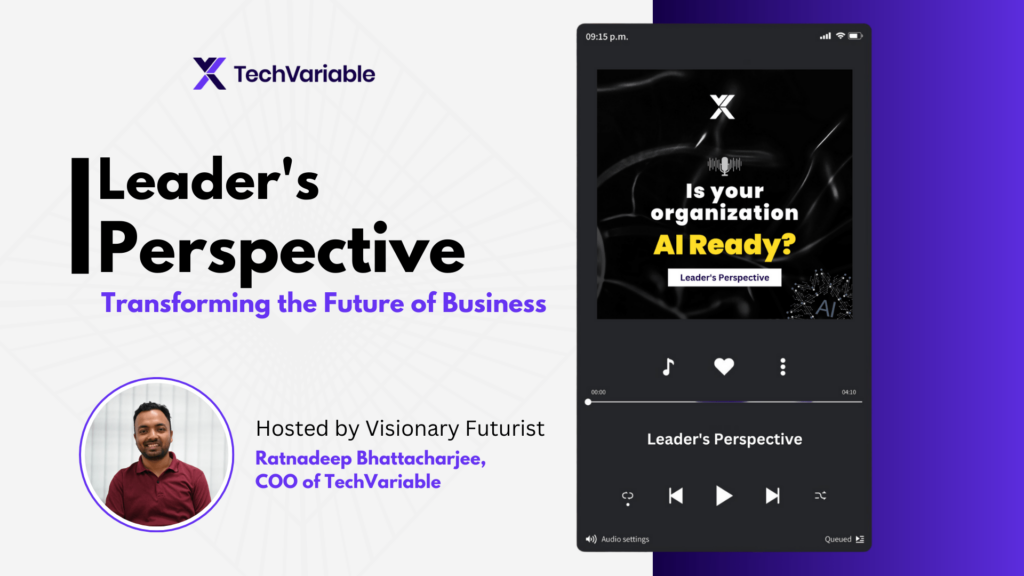Unlock the boundless opportunities presented by digital transformation and thrive in this era of rapid change.
Nearly 85% of AI projects fail to reach production. What factors contribute to this high failure rate?
In the podcast episode titled ’Is Your Organization AI Ready?’, we explore the multifaceted challenges of preparing your organization for successful integration of AI. From comprehending the technological requirements to fostering a culture that embraces AI, we delve deep into the strategic aspects and execution necessary to become AI-ready. Moreover, we address the paramount ethical considerations associated with AI implementation, expertly guided by Chethan’s insights: ‘Get your data ready first.’
Join us to hear directly from a visionary industry leader about the winning strategies against AI, uncovering the vast possibilities for transforming your business landscape.

Ratnadeep: Hello and welcome everyone to another insightful episode of “Leader’s Perspective”. This is your go-to platform where we delve deep into the minds of ‘Industry Titans’, learn about ‘Cutting Edge Trends’, and pick apart the ‘Secret Ingredients of Success’ in a rapidly evolving digital landscape. My name is Ratnadeep Bhattacharjee, Co-founder of TechVariable and your host for today. Like many of you, I have been navigating the complex and fascinating world of digital transformation. I understand the challenges, the breakthroughs, and the constant hunger for innovation that drives us all. Today I’m thrilled to bring you a conversation with someone who is an extraordinary entrepreneur and shares their journey in this industry. He is known for his astute business hacking skills, team leadership, and focus on delivery which has seen him great success in the integral transformation arena. Ladies and gentlemen, let me introduce you to Mr. Chethan Athreyas, CEO of Syntactic AI. With over 13 years of experience, Chethan is transforming the way organizations approach AI Readiness, driving their growth and revolutionizing the industry norms. In today’s episode, we will unravel the topic “Is Your Organization AI Ready?” We will delve into the critical role of AI Readiness in today’s business climate, explore the common challenges that enterprises face, and discuss practical solutions. We’ll also take a deep dive into ethical considerations for implementing AI, share enlightening success stories, and of course benefit from Chethan’s rich experience and insightful discussions. So let’s gear up for an enriching dialogue that sets to spark fresh ideas and inspire new strategies. Welcome to Leaders Perspective Chethan, we are thrilled to have you with us today.
Chethan: Hi Ratnadeep, thank you for the invitation. I’m happy to be here today.
Ratnadeep: First of all, you know Chethan I would like to hear about a fun or unexpected story from your journey of creating a company in the AI space, right? What’s something that sticks out for you?
Chethan: I have been an entrepreneur for quite a long time now, for nearly a decade, and each entrepreneurial journey brings new opportunities for learning and enjoyment. It’s a matter of adapting and embracing the challenges that come our way. But well, there’s one recurring experience that always catches us off guard. During the process of building our AI company, typically, our interactions revolve around corporate clients. And getting them on board is a serious matter. However, it’s interesting how, after concluding a meeting and returning, we find ourselves reflecting on it with a sense of enjoyment. The thing is, AI is not something that can be readily observed with the naked eye, right? It can’t be seen or measured from the customer’s perspective. So, what happens when you have lengthy meetings with clients, prepare presentations, discuss AI, and present its benefits, only to have the board pose the one serious question at the end: “Where is AI in all of this?” That question hits you hard, and despite all the time spent in meetings, you still need to provide a clear definition and explain the role of AI. When you build a mobile application, you can demonstrate it to your clients. When you develop a desktop application, you can let them interact with it firsthand. However, with AI, unless someone experiences it directly, they can’t fully grasp its essence. So, in this field, even though everyone talks about it and doesn’t want to miss out on the AI era, nobody truly comprehends its true nature. And that, in itself, is the fascinating part. Over time, I’ve grown accustomed to this aspect and accepted it as an integral part of the journey. As a company specializing in AI, we have the responsibility to educate and guide others along the way, sometimes simplifying complex concepts as if we were explaining them to a young child. It’s all part of the enjoyable and fulfilling journey we embark on.
Ratnadeep: That’s an interesting insight. No one wants to miss the buzz of the AI Journey. Imagine that you are at a kindergarten and a five-year-old asks you what AI is. How would you explain it? And while you are at it, could you debunk some common myths about AI?
Chethan: Explaining AI to someone can be a bit challenging. Let me try to simplify it for a kid. And for a kid, let me try it out. AI is a big field. The development of certain intelligence to a particular machine to behave like humans is what AI is. For example, think about how kids love watching TV. They always want to watch what they like. Now, imagine if they have something called Alexa. It’s like a magic friend that listens to their commands. They can tell Alexa to turn on the TV, open YouTube, and play their favorite cartoon. A kid who is unable to use the remote control can now use Alexa to turn on the television. I think that’s the best example I can probably give. Alexa uses AI to understand the kid’s voices and do what they want. It’s like having a smart assistant that can understand and follow instructions. So, when the kid talks to Alexa, it captures their words and makes the TV show exactly what they asked for. So that’s probably the easiest way somebody could experience AI.
Ratnadeep: That’s true! Alexa is a great example. So, let’s talk about the importance of AI and its impact. So from your perspective, what’s an unexpected benefit organization might experience by becoming AI-ready? Also, what do you think is a big misconception companies often have about the role of AI in their success?
Chethan: I think that’s a pretty interesting question. It raises two key points. Firstly, what benefits can organizations gain from AI, and secondly, what misconceptions do they currently have about AI? One prevalent misconception is that AI can do everything for you, which is not the case. This is one of the significant challenges organizations face when implementing AI. However, one of the main topics our organization focuses on is this interview, and everyone wants to be a part of it, eager to seize the buzz surrounding AI. While it’s crucial to be enthusiastic and jump on the AI bandwagon, it’s equally important to define and specify the desired use case for AI. Without a clear and specific use case, AI cannot be effectively utilized. Implementing AI requires substantial effort and thoughtful consideration since it involves creating human-like behavior and characteristics for a machine. It’s fascinating that despite only understanding a small portion of the brain’s nervous system, we have been able to develop such advanced technology as AI in the medical field. However, achieving desirable outputs with AI is not a straightforward task. To make a significant impact within an organization, it is crucial to define the specific use case. Whether it aims to enhance efficiency, and productivity, or enable accurate predictions, the use case plays a vital role. Defining the use case is essential for organizations to reduce the repetition of tasks and improve efficiency. In conclusion, it is vital to determine the use case before delving into AI implementation. By clearly defining the use case and feeding the machine with the necessary information, organizations can leverage AI to mimic human behavior and reap the associated advantages. Therefore, organizations should prioritize identifying their specific use case before fully embracing AI.
Ratnadeep: I think that’s of utmost importance when thinking about AI. So, you were talking about AI readiness, right? So picture this- You are creating a road sign that wants the organization of a common pitfall on their journey to AI Readiness, what would it say as far as you are concerned? Also, do you have a story of an organization overcoming a big challenge on its AI journey in a very creative way?
Chethan: Well, I would say that the readiness of organizational data is crucial before delving into discussions about AI. If AI is not already implemented, it remains a step ahead of us as human beings. In the realm of software development, particularly in our work of assisting organizations with building AI solutions, it is important to emphasize not just AI but also ML (Machine Learning). ML can be considered a lower step or a subset of AI. Currently, our focus lies in analyzing the captured organizational data to identify ways to reduce future efforts or address specific use cases. Hence, my suggestion is for organizations to prioritize data readiness. Without adequate data readiness, they cannot truly claim to be AI-ready. Therefore, I strongly advise organizations to focus on preparing their data as the initial step, rather than hastily diving into the AI trend. Nowadays, data collection is ubiquitous in various forms within organizations, encompassing customer data, project data, and production data. The question arises: How can organizations leverage this data to improve their return on investment, make informed business forecasts, or achieve their desired objectives? Consequently, data readiness becomes crucial, serving as a vital step toward achieving those goals.We have worked with a diverse range of companies, from startups to enterprises, in this field. While I cannot disclose specific company names or initiatives, I have encountered numerous organizations seeking our consulting services to ensure data readiness before embarking on their AI journey or defining AI use cases. Notably, direct-to-consumer (D2C) brands extensively capture customer data, enabling them to take swift and informed actions, maintain customer engagement, and receive valuable feedback in real-time.Therefore, capturing and preparing data in real time for AI applications is of utmost importance. I have witnessed many organizations efficiently implementing these practices, often with the help of appropriate courses and training. AI implementation revolves around disciplined processes and well-defined outcomes. If organizations adhere to these principles, success in AI initiatives becomes achievable. It is worth noting that approximately 80 to 85 percent of AI projects fail to reach production, primarily due to inadequate data readiness. Hence, my key message is to prioritize data readiness as the foundation for discussing AI with anyone.
Ratnadeep: That would be very demoralizing for a few people who are on the bandwagon of AI. What would a day look like for a company that’s got its data infrastructure perfectly in sync with its AI operations? Also, is there any surprising connection between AI and Data Infrastructure that’s less known but crucial to understand?
Chethan: I would say that the interconnectedness of the data infrastructure is crucial for the effective functioning of an organization. The data life cycle involves collecting, processing, and structuring data for various use cases in AI. This segment in the data life cycle is important and should not be overlooked. Having a robust data infrastructure is of utmost importance. It serves as an asset base where data is collected from multiple sources within the organization, such as databases, SAAS applications, or proprietary systems. Each of these sources contains different data types and datasets. Bringing all this information together creates a knowledge base within the data infrastructure, which can then be utilized for specific use cases. If the processes involved in this data life cycle are well-defined and aligned, it can greatly benefit an organization that aims to implement AI. Having access to relevant and high-quality data is crucial before delving into AI implementation. Once the data is in place, the organization is ready to initiate the journey toward implementing AI successfully. In a company that has achieved the right balance, a typical day would involve managing the data infrastructure effectively. Although many tasks are automated within the system, it is still necessary to have personnel overseeing and ensuring everything runs smoothly. While technology drives automation, humans play a vital role in maintaining and managing AI systems. Human intervention ensures that things are in order and align with the desired end outcomes. By clearly understanding the desired outcomes, the day-to-day operations become simplified, and the system can provide the expected results.
Ratnadeep: That makes absolute sense. So one of the other important keywords that we keep on hearing is “analytics”. What is the role of analytics in AI? Do you have a eureka moment where a company found something groundbreaking, thanks to analytics in their AI Journey? If you had to describe the relationship between analytics and AI using a metaphor, what would it look like?
Chethan: I would say that AI and analytics are like siblings, sharing the same foundation. They serve different purposes, with analytics focusing on specific desired outcomes for the audience, while AI strives for defined results. However, both heavily rely on the organization’s collected or desired data. In fact, organizations that seek to harness data for improved decision-making typically begin their journey with analytics, as it establishes the necessary infrastructure. During this initial phase, data is processed, segmented, and organized based on preferences, and desired outcomes are defined. Two main outcomes emerge: first, visualizing the data through various tools to create graphical representations and structured parameters, gaining a clearer understanding of achievable goals. Second, developing intelligent applications that positively impact the business. Analytics involves exploring available data, visualizing and interpreting it, and considering different permutations and combinations. On the other hand, AI focuses on utilizing this data to build enhanced systems, enabling forecasting, generating recommendations, and supporting the business. While they have distinct use cases, both analytics and AI heavily rely on data. Insights gained from analytics help shape the parameters for AI’s use cases. It’s a crucial step before diving into AI application development or building any hidden applications. By establishing analytics first, it ensures that AI development aligns with desired outcomes and simplifies the process. Therefore, analytics and AI are closely intertwined and play vital roles within organizations. Looking at it from the AI perspective, AI aims to emulate human behavior and characteristics through intelligent software. However, human management remains crucial. Various professionals contribute to these endeavors, including data engineers, data analysts, data scientists, machine learning developers, statisticians, and more. Each individual brings a unique approach to working with data and bringing AI applications to life, ultimately achieving desired outcomes. Hence, analytics and AI always work hand-in-hand within organizations.
Ratnadeep: With great power comes great responsibility. And ethics is a big conversation in AI. Can you share an example of an ethical dilemma involving AI that made you think twice? Also, could you enlighten us on how organizations might accidentally trip up ethically when implementing AI?
Chethan: It’s a common concern among AI enthusiasts, and rightly so, given the abundance of accessible information these days. Organizations, operating within the confines of regulations and laws, often collect data they desire while attempting to avoid missing out on valuable insights. This predicament raises ethical questions regarding the appropriate utilization of such data. Allow me to illustrate this point with a brief example. In today’s social media-dominated era, whether you use Instagram or Facebook, you are exposed to targeted ads without even realizing it. These ads are specifically tailored to your preferences, subtly suggesting, “Hey! This is what might interest you.” How does this occur? We are aware that our phones capture our conversations, and various other methods of data collection are also employed. Behind the scenes, an AI system processes this data and presents relevant ads based on your location. I personally experienced this phenomenon. A few months ago, I underwent dental surgery. Before the procedure, I followed a specific route from my office to my house, picking up my wife along the way. During our commute, we often discussed dental clinics. To my surprise, I received a notification about a discounted offer from a dental clinic situated merely 50 meters away from my current location. It struck me that these suggestions were derived from my personal conversations with my wife. Consequently, I felt tempted to consider visiting the dental clinic due to the allure of discounted treatment. This situation emphasizes the ethical dilemma surrounding what is deemed right and wrong. However, it is crucial to recognize that regulations will undoubtedly play a crucial role in shaping the ethical use of data for AI purposes in the future. Governments and other regulatory bodies are actively engaged in overseeing and controlling these practices.
Ratnadeep: AI will be much much straight and tightened in the coming days. Looking at the possibilities that AI has, let’s talk about a few success stories and missteps. Could you share a cautionary tale from an organization that didn’t prepare for AI adequately?
Chethan: I would say there are several use cases, as I mentioned earlier. AI has the potential to be highly successful when well-defined. Currently, larger enterprises are leading the adoption of AI and data utilization within their processes. These organizations have vast amounts of data at their disposal, which they recognize as crucial for their future growth. We have collaborated with some of these enterprises, who have embraced the current AI trend. However, certain internal factors, such as hierarchical structures, hinder their progress in implementing AI solutions. As I mentioned before, a proper data-driven mindset and infrastructure are necessary to effectively define AI use cases. Unfortunately, many organizations are eager to jump on the AI bandwagon without considering the extensive process involved. Without discipline, structure, and the right infrastructure, successful implementation becomes challenging. Consequently, a significant portion (around 80-90%) of AI initiatives fail to reach the production stage due to these reasons. On the other hand, I also work with startups that prioritize efficiency over formal processes. Despite their unconventional approach, they have well-defined structures and unique use cases, which can have a substantial impact within their organizations. I have been involved with one such startup from its early bootstrap phase, and I consider myself a partner in their journey. They have made impressive strides in technology adoption and AI utilization, leading to significant growth within just a few years. I can provide a noteworthy case study in the fintech space where they use AI to expedite loan processes, resulting in faster and more accessible loan offerings. This use case has a tangible impact on people’s lives. Furthermore, these startups are also efficient in their internal operations, saving substantial time compared to traditional banking processes for loan applications. Through AI implementation, they streamline and expedite the loan process, benefiting both the organization and the customers. This is an excellent example of an impactful use case that enhances efficiency. In summary, there are various use cases for AI, with larger enterprises driving its adoption. However, internal factors can impede progress, necessitating a structured approach. Conversely, startups with well-defined structures and unique use cases can achieve remarkable results. One such case study in the fintech sector demonstrates how AI accelerates loan processing and positively affects customers’ lives.
Ratnadeep: I have a similar story about a health tech company we’re currently collaborating with. We began our partnership during their bootstrap phase, and they’re now on the verge of receiving substantial funding. Startups probably grasp certain concepts better than most enterprises. Now let’s talk about the future of AI. Do you have any surprising predictions about AI’s role in businesses? And, if an organization is reluctant about getting AI-ready, how would you convince them that they are missing out?
Chethan: I’m not certain how to accurately predict what AI will bring in the future. However, it’s likely that AI could assist us in improving prediction capabilities. It is important for us to accept the ongoing change that is happening. This transformation is unstoppable, and everyone should embrace it. One common misconception is the fear of AI taking away jobs, but in reality, it is ultimately dependent on people. AI can enhance efficiency and productivity, but individuals need to adapt and learn from new systems. That’s how progress should be approached. As for the future, widespread integration of AI may take some time, especially in everyday life. Currently, we observe real-use cases in robotics, such as Boston Dynamics’ robotic dog. Although technologies like Alexa represent advancements, complete integration of AI will require more time. Nevertheless, it is inevitable and we should prepare ourselves. Just like the impactful revolution brought about by WhatsApp, AI will shape our lives in unforeseen ways. We are currently in a data revolution era, where data is being shared and utilized in various ways. If ethical and beneficial solutions can be built with this data, it should be embraced. However, there will always be individuals who are reluctant to accept new developments. It is important to be proactive and adaptable in order to stay ahead. Organizations should ensure their data is ready and their infrastructure is in place before diving into AI initiatives. Being prepared for AI is a wise approach in today’s era. Over the next decade, we can expect to witness exciting advancements, provided there are adequate regulations to protect human rights and ensure ethical practices. Let’s move forward effectively and ethically, knowing that AI, like Thanos, is listening and stating, “I am inevitable.”
Ratnadeep: So, as we wrap up, could you share an AI-related book article or a resource that has profoundly impacted you? Also, why would you recommend it to our listeners? And additionally, how can our listeners turn what they learned from this podcast into actionable steps right away?
Chethan: I must admit, I wasn’t really a big fan of reading books until recently when I was recommended one by my mentor. The book is called “Human Compatible: Artificial Intelligence and the Problem of Control” by Stuart J. Russell. I haven’t read much of it yet, just a few videos, but it delves into the challenges of aligning AI systems with human values and the ethical implications involved. It’s quite fascinating, and I think people interested in bringing AI into their lives should look into Stuart J. Russell’s work. As AI becomes increasingly integrated into our daily lives, it’s important to consider how it aligns with our day-to-day activities, and this book addresses that topic. Before we wrap up, I’d like to mention that technology keeps evolving, from Information Technology to internet technology, and now it’s all about access to information and the internet combined with the power of AI. So, I encourage you to start exploring and embracing these advancements. If you find something you like, go with the flow and take a step forward. That’s my personal belief. As for assistants like you, I think they’ll play a significant role in this ever-changing landscape. Chethan, I agree with you on that point. It has been an enlightening conversation today, and your insights into AI readiness, digital transformation, and your experiences have given us a lot to ponder. For those listening, I hope this discussion has provided valuable insights on how to navigate the journey towards AI readiness, not just technologically but also in terms of mindset, culture, and ethics. As we continue to explore AI’s role in our businesses and lives, conversations like these equip us with understanding and curiosity to move forward. They remind us to stay aware, be prepared, and seize the opportunities that AI and digital transformation present.
Ratnadeep: A huge thank you to you Chethan, for taking the time to share your wisdom with us today. I know our listeners will find it as invaluable as I did. For our listeners, who would like to learn more about Chethan’s work at SyntacticAI, we’ll include links and resources in the episode notes(description). I highly encourage you to explore them. In the spirit of continuous learning and growth, I would like to end this episode with a challenge for all of us. Let’s take one key takeaway from our discussion today and put it into action within your organization. I’m Ratnadeep, Co-founder of TechVariable and it’s been a pleasure being your host today. Stay curious, keep innovating, and let’s shape the future of digital transformation together. Until next time on “Leader’s Perspective”. Thank You.
Download the free PDF here!
Don't forget to share the post!
Leader’s Perspective- a podcast to unearth insights from exceptional trailblazers who have been at the heart of defining strategies and execution of Digital Transformation initiatives in their careers. As organisations scurry to implement the Next Big AI initiative, the cognitive perspectives of our guests help you to find the winning mantra, or what might just save you from a pitfall. Let’s aim for collective wellbeing and implement successful data initiatives.
We’re committed to your privacy. We use the information you
provide only for notifications regarding our podcast.








